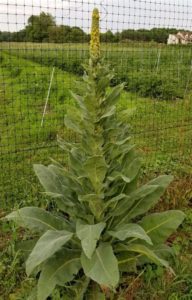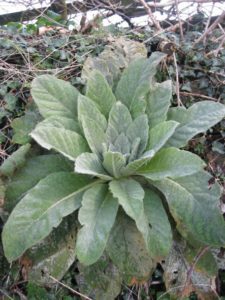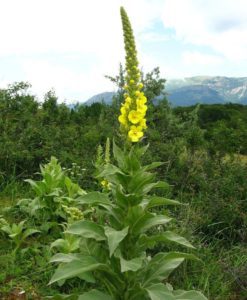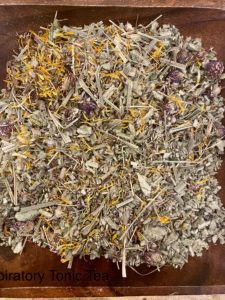Mullein
Scientific Name: Verbascum thapsus

Mullein is one of our best remedies for chronic asthma, respiratory inflammation, ear infection, urinary incontinence, bladder weakness, and spinal injury.
Mullein is native to Europe, northern parts of Africa, and central and western Asia. It’s now naturalized and widespread across North America and most of the temperate world. Its range is so broad that is is generally considered a weed in North America and other parts of Australia, New Zealand and the cooler regions of South America. Mullein appears in places where the earth has been opened up and disturbed. It can be found in roadside ditches, around creeks and trampled pastures. It is a resilient plant and is invigorating to watch sprout up tall before it ends its biennial life span.
In Mulleins first year of life, it produces a basal rosette of thick, flannel-soft leaves. They have a silvery, frosted appearance from the thick downy hairs that blanket them on both sides. These hairs afford effective protection against grazing animals and water loss-a necessary design for a plant that mostly grows in dry soils.

Its second year, mullein raises its stalk up high and produces tons of small yellow flowers. Fun fact! Mullein’s stalks have traditionally been a source of firelight-they were once dried, dipped in fat or oil, and lit as slow-burning torches. How cool is that?! Fuzzy soft leaves hug the stalk, becoming progressively smaller and more lanceolate as they ascend. When picked, the leaves (and flowers) leave behind small scars, which soon become filled with a dark, vanilla-scented resin.

Medicinal Actions: Respiratory tonic, expectorant, antispasmodic, anti-inflammatory, demulcent, and vulnerary.
Energetics: Cooling and slightly moistening.
Medicinal Uses: As common as mullein may be in the world around us, it has a extraordinary nich for deep healing. It doesn’t get enough credit in the herbal world, but mullein has a special affinity for respiratory ailments, spinal injuries, urinary afflictions and lymphatic conditions. Every part of this woolly healer is medicinal-root, leaf, and flower-but the leaf is the primary part we see in commerce.
As herb of many talents, mullein is well known for its healing gifts to the respiratory system. A gentle respiratory tonic, mullein leaf steadily strengthens the lungs and helps moisten dry mucosal tissues. This makes it an excellent remedy for those with asthma, emphysema, or chronic inflammation in the lungs.
Mullein leaf is also productive for acute conditions such as cough, croup, bronchitis, sore throat, hoarseness, and bronchial catarrh. It’s particularly indicated where there is wheezing, a feeling of tightness in the chest, or difficulty drawing a full breath. Hot, dry, tickling coughs are its specialty- such as the coughs that can linger following a cold. For acute respiratory distress, some herbalists recommend inhaling the smoke of dried mullein leaves. The smoke quickly infuses the lungs and can relax the bronchioles very effectively, making it an option for those who experience acute asthma attacks. Good results are achieved by crumbling a few dried leaves, placing them in a brazier or fireproof dish, and lightning them on fire until they begin to smoke.
As a respiratory remedy, mullein is safe for the whole family. Mild tasting and effective, its leaves and flowers can be stirred into all kinds of medicine. It’s super convenient to throw in some elderberry, and I have also formulated a respiratory tonic tea you can find here. It includes mullein, fennel, rosehips, lemongrass, calendula and red clover. For a quick way to get the medicine, I have formulated it into this tincture blend that we take everywhere to use on hand for onset symptoms of cold and flu virus to strep virus to everything in between! This is our most popular seller at farmers markets!

Respiratory Tonic Tea
Rosemary Gladstar describes mullein flower as the “remedy par excellence for ear infections” and countless swift cures have been reported from its use. It both treats the infection and relieves aching pain. An oil of the dried or freshly wilted flowers is most commonly used, but some prefer the highly diluted tincture, as the drying nature of the alcohol helps clear bacterial infections.
Mullein flowers are a wonderful nervine remedy for pain in general, especially for children. They are relaxing and sedative and can bring sleep when pain or discomfort gets in the way. Interestingly enough, the root of mullein is used as a treatment for inflammation and pain that’s associated with Bell’s palsy, trigeminal neuralgia and temporomandibular joint (TMJ) pain.
The roots of Mullein and leaves are effective medicines for the joints, bones, cartilage, and spine. In large part, this is commemorating the work of herbalist Jim McDonald, who uses mullein as a remedy for the skeletal system. Jim compares the mulleins upright stalk to a human spine- noting that the roots and basal leaves are such good medicine because they contain the energy that sends its tall stem straight up into the sky. Jim has used the root to treat his own spinal injuries (herniated disc, thrown back) with “immediate” results. His review: ” It’s truly kick-a#$ stuff”. Mullein heals by increasing synovial fluids, which lubricate joints and vertebrae-easing pain and inflammation, increasing flexibility, and healing damaged tissues. Mullein is effective for spinal injuries, nerve pain, spinal dryness, bone fractures, arthiritis, inflamed joints, and scoliosis. A poultice or compress is also helpful, especially for broken bones, sprains, and arthritis.
Most obscurely, mullein root is a truly valuable tonic for the bladder and urinary system. A fresh root tincture effectively strengthens and tones the trigone muscle (a triangular muscle at the base of the bladder) and improves bladder function. It can be used as a long-term tonic for recurring bladder infections, interstitial cystitis, and benign prostatic hypertrophy. Mullein root is also one of our most effective herbal treatments for incontinence associated with mild physical stress (coughing, heavy lifting, laughing or running), pregnancy, postpartum, and menopause. Likewise, it can be helpful for children who are wetting the bed after the age of four.
Tidbits: Mullein is a dream for those who live close to the earth or who are preparedness-minded. It’s top choice plant for wild-gathered fire kits-its dried stalk is one of the best hand-drill spindles around, and the downy covering on the stems and leaves makes wonderful tinder. Pioneers once lined the bottom of the their shoes with the soft leaves and this is still a nifty trick employed by trekers. Mullein is also knows as “cowboy’s toilet paper” (no explanation needed here) haha!
Here are some pubmed studies on mullein (Verbascum thapsus) if you like to dig deeper. Click here.
Mullein is featured here in the shop: Respiratory tonic tea, Cold Be Gone, Mullein
